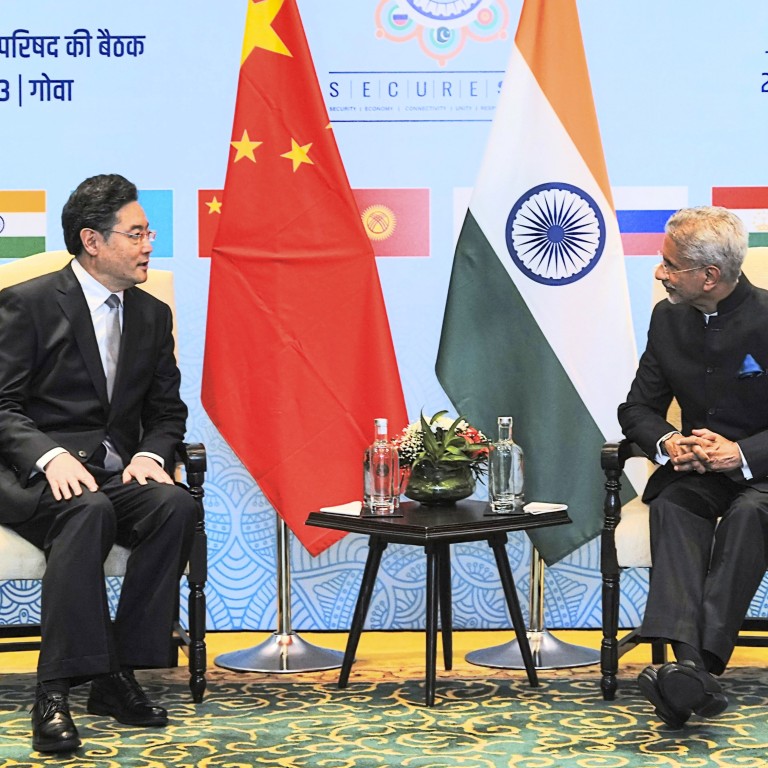
Chinese Foreign Minister Qin Gang urges neighbours to keep their distance from US
- Analysts said the comments at a Shanghai Cooperation Organisation meeting were tailored to his Indian hosts and other members
- The comments are the latest example of China trying to woo US partners by maintaining their ‘strategic autonomy’
Qin’s comments during his second visit to India in the space of two months were seen by analysts as a tailored message to other members of the Shanghai Cooperation Organisation and particularly his hosts.
The SCO foreign ministers’ meeting concluded in Goa on Friday with a joint statement calling for the expansion of the bloc and cooperation on regional security and fighting terrorism.
“The world is facing multiple crises and challenges today, with the resurgence of the cold war, the counter-current of unilateral protectionism and the rise of hegemony and power politics,” Qin said according to a foreign ministry statement.
He described the SCO as “a major constructive force” on the world stage, and said it should play a greater role by building a community with a shared future in a spirit of mutual trust, equality and consultation.
The SCO was founded by China and Russia in 2001, initially as a grouping focused on security cooperation and combating terrorism to counterbalance the US and its numerous alliances across Eurasia.
China’s Qin Gang pledges to keep Moscow close in Ukraine peace bid
In 2017 India and Pakistan joined the bloc, which also includes Kazakhstan, Kyrgyzstan, Tajikistan and Uzbekistan.
“We should adhere to strategic autonomy and strengthen solidarity and mutual trust. We should firmly support each other in safeguarding sovereignty, security and development interests, and oppose external forces meddling in regional affairs and staging ‘colour revolutions’,” Qin said.
“The US has been keen to pull India into its orbit. While India has so far remained a swing nation in the US-China rivalry, its growing military ties with Washington and its participation in the US-led Quad grouping are worrying,” he said.
Wang said the best scenario for Beijing would be for India to remain neutral between China and the US, which explained Qin’s remarks about strategic autonomy.
“I think what India did is mainly to gain leverage in border talks with China,” Wang added. “Although India insists that peace and tranquillity in the border areas should be the prerequisite for normalisation of ties, China does not see India as an adversary.”
He said that high-level exchanges such as Qin’s recent visit and a planned trip by President Xi Jinping to the SCO summit in New Delhi in July will “no doubt help create a favourable environment for the two powers to move beyond the deadlocked border differences”.
China-India relations: Qin Gang pledges better dialogue to improve ties
During Friday’s gathering, Qin also stressed the importance of combating terrorism and cracking down on the “three evil forces” of terrorism, ethnic separatism and religious extremism, particularly in Xinjiang.
He also called for joint efforts to support Afghanistan in its political transformation and tackle drug trafficking and transnational organised crime.
The Chinese diplomat also called on regional countries to stand with China to “resolutely resist any acts that undermine the international economic and trade order and market rules, and maintain the stability and smoothness of the industrial supply chain”.
Qin also said the SCO “must uphold fairness and justice and improve global governance” to build a “more just and reasonable” international order.
The joint statement issued after the gathering said the SCO had agreed to “further strengthen security cooperation and jointly combat terrorism, separatism, drug production and trafficking, and cybercrime.”
India’s Minister for External Affairs, Subrahmanyam Jaishankar, said the SCO was concerned about the security situation in Afghanistan, where the Taliban swept to power after America’s chaotic departure in 2021, and expressed disappointment at international bodies’ handling of the Covid-19 crisis and other geopolitical upheaval.
“These crises have also exposed a credibility and trust deficit in the ability of global institutions to manage challenges in a timely and efficient manner,” he said. “With more than 40 per cent of the world’s population within the SCO, our collective decisions will surely have a global impact.”
The expansion of the group to include Iran and Belarus was high on the agenda of the foreign ministers’ meeting.
Iran, which signed documents for SCO’s membership at last year’s summit in the Uzbek city of Samarkand, is expected to be inducted at the New Delhi summit in July.
India gets a ‘free pass’ on rights concerns as US-China rivalry deepens
The diplomats also discussed the application of Belarus and how to “accelerate the procedures to accept it into the organisation”, according to the Russian foreign ministry.
Bahrain, Kuwait, Myanmar, the United Arab Emirates and Maldives are also likely to be granted the status of dialogue partners ahead of possible full membership, allowing them “to work with the SCO on matters of mutual interest”, it added.
Qin also said the SCO should complete the expansion process “in an orderly manner, promote the SCO to better adapt to the development and changes in the situation, enhance cohesion, improve action and expand its influence”.


